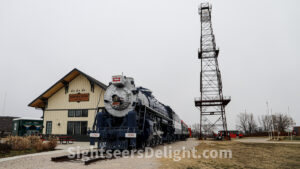Route 66 Historical Village is an open-air museum highlighting Tulsa’s oil, refining and transportation history. The Visitor’s Center replicates a 1920s Phillips 66 gas station, and the museum is also home to the tallest oil derrick in North America, a Pullman passenger car commissioned in 1929 and Frisco 4500, a 4-8-4 steam engine that pulled the the St. Louis-San Francisco Railway’s Meteor passenger train. In 1901, oil was discovered on former Creek land, which led to Tulsa becoming known as the “Oil Capital of the World,” and the derrick sits on the southeast corner of the Sue Bland No. 1 oil lease. The Route 66 Village was created as part of a partnership called Vision 2025, which, in part, aims to rebuild the Historic Route 66 Highway, through Tulsa County.
Route 66 Historical Village
Type of Attraction
Description

